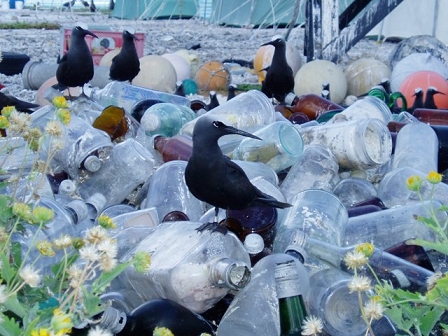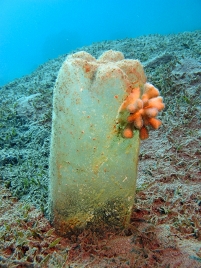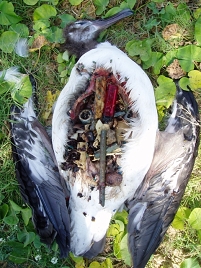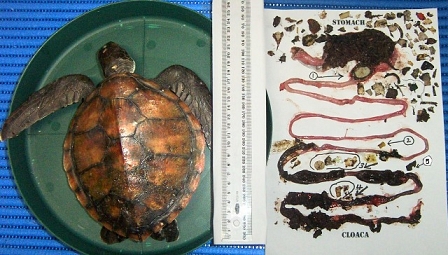Erstellt am: 10. 5. 2011 - 17:27 Uhr
Fishing For Plastic
Should European taxpayers’ money be used to pay fishermen to scoop plastic out of the water?
A trial project to do exactly that is to be launched this month in the Mediterranean by the European Union Commissioner for Fisheries Maria Damanaki. There is a compelling logic behind the idea. The oceans and seas around Europe have been depleted of commercially lucrative fish but are sadly abundant with the millions of tonnes of plastic waste we throw away.
Paying fishermen, who will be armed with specially modified nets, to act as glorified trash collectors might not offer the romantic life led by Captain Ahab but it might stave off a further collapse of our fish stocks and save jobs.

seaweb.org
It’s all part of the E.U.’s attempts to modify its fishing policies to make the industry more sustainable in a new world where the saying “plenty more fish in the sea" seems ever more anachronistic. This has meant proposals to reduce quotas, giving stocks time to recover, and banning "discards" – the practice of throwing millions of tonnes of fish that is edible but of little commercial value back into the sea. This wasteful practice, highlighted by recent documentaries, has been slammed by marine biologists and ecologists. But with high fuel prices and ongoing economic turbulence, fishing industry representatives say that they are under enough financial pressure already, and if they are forced to bring the less valuable catches to port they will go out of business.
The plastics idea has been thrown into the deal apparently as a ‘sweetener’ to offer the cash-strapped fishermen a chance of alternative revenue. While the scheme will be initially powered by public funding, the plastic will be recycled and it’s hoped that eventually that will create an independent self-sustaining industry. But it has been derided by many inside the fishing industry and EU-sceptical newspaper commentators.

© Ziggy Livnat 08/Marine Photobank
Conservation biologist Professor Callum Roberts, on the other hand, says that fishing for plastic is a “great idea” that we should take very seriously. The ecologist from the University of York says the scale of the plastic problem is mind-boggling. Every year, about 18,000 pieces of rubbish, most of it plastic, washes ashore for each kilometre of beach in the Mediterranean. “We have to do something about it and fishermen are the most obvious candidates to help since they have the facilities at their proposal to fish this plastic out of the water.”
Although international laws against deliberate dumping of plastic at sea have been in force since 1998, it is hard to implement them effectively. If an unscrupulous crew aboard a ship that is far out of sight of land wants to throw rubbish overboard, little can be done to stop them doing so. There are also inevitable accidents; tonnes of fishing equipment are lost at sea every year and much of it is plastic. But the greatest burden of plastic comes from the vast quantities of rubbish that we throw away that are flushed out via rivers and estuaries out to sea. “If you look at any river at its mouth, “says Callum Roberts, “you’ll see all these plastic bottles and bags just floating past. There’s this continuous input.”

seaweb.org
Turtles and sea birds are the first to suffer from this flow of waste. They mistake the plastic detritus for tasty snacks. A few generations ago, they could be pretty sure that anything floating on the surface of the ocean was food, now it is likely to choke them. According to Professor Roberts, 19 out of every 20 fulmars (those grey and white gull-like birds) that wash up dead onto European beaches “have a belly full of plastic”.
Fish eat the plastic too, usually after it has broken down into much smaller parts. After decades floating around in the ocean, the pieces eventually become microscopic and spread out across the ocean where they are ingested by pretty much everything that swims. Professor Roberts says that “in some places, there is more plastic than plankton.”
Ecologically speaking, that’s bad enough, but from an anthropocentric point of view there is an even more alarming consequence. These small pieces of plastic attract toxic chemicals to their surfaces, building up, over time, concentrations of poisonous chemicals such as pesticides that, according to Professor Roberts, can sometimes reach thousands of times the background levels of toxicity. When ingested, these poisons are absorbed into the flesh of the small fish and work up the food chain until, perhaps disguised seductively as a delicious piece of sushi, they find their way onto our dinner plates.
So fishing for plastics is in our own selfish interest but, and you’ll pardon the pun, there is always a catch.

seaweb.org
Because the plastic bags and bottles which were once carelessly thrown away years ago, have since fragmented and become a widely dispersed soup, we can’t solve this ecological disaster with the few nets envisaged by the EU project – the most harmful elements will simply slip through.
Interview with Dr Callum Roberts
Dieses Element ist nicht mehr verfügbar
But Professor Callum Roberts points out that it can stop the problem getting worse by catching much of the plastic before it fragments. Ultimately the only way to stop our plastics poisoning our oceans and ultimately ourselves is to stop using so much of it and not throwing it so carelessly away. That’s why ecologists have applauded Italy’s ban of plastic bags. But if I was a turtle, fed up of having to discern between a jellyfish and supermarket bag, I would clap my flippers at Damanaki’s much ridiculed idea.


